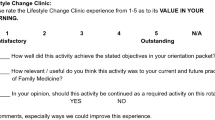Abstract
Physicians who specialize in family medicine and general practice have the potential to assume a major role in helping patients change their health promotion practices. Little is known about the proportion of routine consultation time devoted to primary prevention counseling or the factors that influence the provision of this kind of patient education. A survey of General and Family Practitioners was conducted to determine the extent to which these physicians perform health promotion counseling as well as their perceptions regarding constraints affecting their efforts, confidence in their ability to change patient's behaviors, and the training required to enhance their efforts. Differences, with respect to their health promotion practices, between General and Family Practitioners, were also examined. One hundred and ninety-five physicians completed the survey for a response rate of 68%. When year of graduation from medical school was controlled there was little difference in the health promotion practices of General and Family Practitioners. This study suggests residency training in the specialty of family medicine does not provide residents with the knowledge, confidence and skills to perform health prevention counseling at a level different than that practiced by General Practitioners.
Similar content being viewed by others
References
Barker, W:Teaching Preventive Medicine In Primary Care. New York: Springer, 1982.
DeFreis, G, Berry, W:Health Promotion and Disease Prevention in the Clinical Practice of Medicine and Dentistry. Health Services Research Center: University of North Carolina, 1981.
U.S. Public Health Service Reports. Department of Human Health and Human Services, Publication No. (PHS) 83-1572, Series 10, No. 144, 1980.
DiMatteo, D, DiNicola, D:Achieving Patient Compliance: The Psychology of the Medical Practitioners Role. New York: Pergamon-Press, 1980.
Weschler, H, Levine, S, Idelson, R, Rohman, M, Taylor, J, The physicians role in health promotion: A survey of primary care practitioners.New England J Medicine 308:97–100, 1983.
Wells, K, Physicians practices in counseling patients about health habits.Medical Care 22:360, 1984.
Author information
Authors and Affiliations
Additional information
Linda Attarian M.P.H. is a Research Associate at the Department of Family Medicine, University of North Carolina, Chapel Hill. Michael Fleming M.D. is Assistant Professor in the Department of Family Medicine, University of North Carolina, Chapel Hill. Patricia Barron, M.P.H. is a Research Associate at the Department of Family Medicine, University of North Carolina, Chapel Hill. Victor Strecher Ph.D. is Assistant Professor in the Department of Health Education, University of North Carolina, Chapel Hill.
Rights and permissions
About this article
Cite this article
Attarian, L., Fleming, M., Barron, P. et al. A comparison of health promotion practices of general practitioners and residency trained family physicians. J Community Health 12, 31–39 (1987). https://doi.org/10.1007/BF01321395
Issue Date:
DOI: https://doi.org/10.1007/BF01321395




